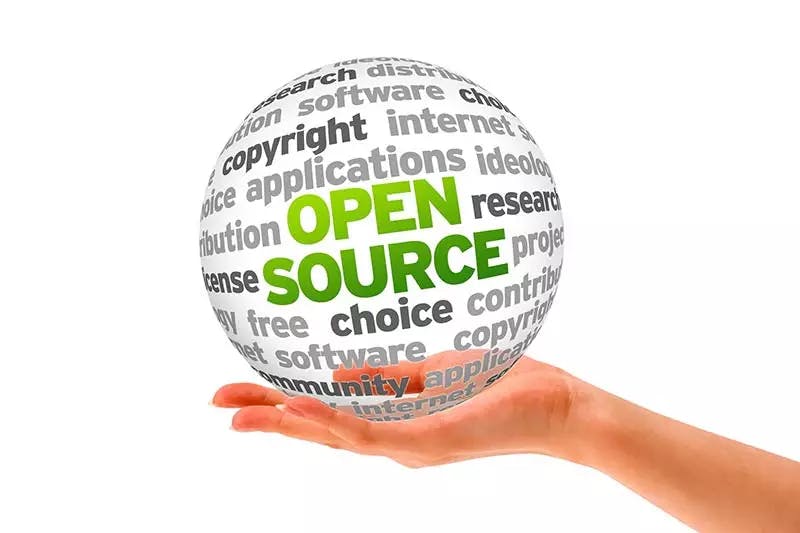Table of contents
No headings in the article.
Open-Source Software is a type of software whose code is publicly available to use and modify. Open-Source Contribution involves contributing to the development or improvement of open-source software.
Open-source software powers a huge portion of the Internet and many applications that we use every day. Massive projects like Linux, WordPress, and Firefox are all open source, as well as popular projects like React Native, Angular, and Kubernetes.

What Is Open Source?
Open-source software has a few key characteristics:
- It’s free to use
- The source code is accessible
- Developers are free to modify the source code for their own purposes, including for commercial use.
Some open-source projects are completely not-for-profit and run by volunteers. Others are offshoots of proprietary software products, like the open-source repositories maintained by BigCommerce. Most, but not all, open-source projects accept contributions from the public.
The concept of open source was built upon ideas around free software dating back to the early days of software development but coalesced into a movement with the founding of the Open Source Initiative in 1998. Today, there are thousands of open-source projects run by maintainers from around the world.
There are a number of approved licenses that open-source software projects can use. Many BigCommerce projects are licensed under the MIT License, which grants users the ability to use, modify, and distribute the software free of charge.
Advantages of Open Source Software
The first advantage we’ll discuss won’t be surprising — open source software is free, which is a definite plus. But, that low cost to entry can also be a powerful driver of technological innovation. A prime example is Linux, which powers a large portion of web servers. According to W3Techs, Unix web servers power about two-thirds of sites on the internet, and many if not most of those are running Linux. Why is Linux so dominant? It’s simple — a Windows server license costs money while Linux is free. So, it sums it up: “Linux is this thing that you can’t live without and somehow it’s free. And it’s great — I can keep installing server after server after server.” That ability to scale up infrastructure at a low cost was a key contributing factor to the spread of the internet.
Another huge advantage for developers is that it saves time and effort. Open-source software fits directly into the patterns that many modern software developers use to build-out projects. Instead of building something completely from scratch, it makes sense to look for a framework or an existing project that provides a foundation, a starting point, that you can modify to fit your specific needs. That allows you to build upon existing software in a modular way instead of having to reinvent the wheel with every new project. “Open source software gives you an opportunity to grab something and own it without having to spend all the time writing it, and there’s a certain benefit to that,” Robert says.
Why Should You Contribute to Open Source?
You don’t have to contribute to open-source software to benefit, but there are lots of reasons why you might want to dive in and get involved. Whether you’re interested in stretching your skills as a programmer, want to improve the software that you already use, or would like to connect with a network of like-minded individuals, contributing to an open-source project can get you there.
1. Further your career.
In addition to your portfolio, open-source contributions are a publicly visible, tangible indication of your skills — and that’s something prospective employers look for. Even if you’re not on the market for a new position, making contributions to open source projects is a great way to exercise skills outside of your day job and stretch yourself by solving new problems. Beyond that, open-source contributions are a signal that you’re passionate about the technology you work with, and that’s a valuable quality to future employers and teammates.
2. Understand the inner workings of a project.
Diving into the source code is an essential way to understand a new technology on a deeper level. When there’s a failure in the documentation, you just go look at the code. By understanding the inner workings of each and every section of the project helps to know the project well and eventually, you can make a significant contribution towards the project.
3. Make a project you use better.
Many open source contributors make their first contribution because they see an opportunity to make a project that they already use better. Maybe they fixed a bug or added a useful new feature — in that case, submitting a pull request so the broader community can also benefit just makes sense.
This kind of crowd-sourced development is one reason why many open source projects are so robust. If many developers and organizations have projects that depend on an open-source product, they have an incentive to make sure that the quality of that dependency is high. Not to mention, the more developers who are scoping out bugs and adding new features, the more can be accomplished and the better that project will be.
4. Connect with a community.
Getting involved with an open-source project can be a great way to make connections with fellow collaborators. Many open-source projects have thriving communities around them. For example, WordPress boasts over 1500 meetup groups around the world, with 700,277 members. While only a portion of those members is actively contributing code to WordPress, the WordPress community emphasizes the fact that everyone has something to contribute, and you don’t have to contribute code to make an impact. You can help with documentation, translations, and support tickets in addition to patching bugs.
5. Give back.
For some developers, contributing to an open-source project is a way of paying credit to a software product that’s being used for free. “If you use a project, you really need to contribute to it,” Carson says. “That’s the debt that you owe to this project. That’s the licensing fee.”
It’s easy to begin taking open source projects for granted, but it’s important to keep in mind that many open source projects are managed by volunteers and sustained by donations. Providing your time and skills to keep a project going is the best way to make sure it’ll be there to use in the future.
Making Your First Contribution
Now that we’ve reviewed a few of the reasons to contribute to open source…how do you get started? If you’ve never contributed to a crowd-sourced project before or you’re new to GitHub, making your first contribution can be intimidating. Not to mention, it can be difficult to know where to begin. How do you find your niche to begin making a difference?
Something to keep in mind is that you don’t have to take on a huge task to have an impact. “What really pushes these projects along at the end of the day is not the one or two giant contributions. It’s the hundred small contributions that happen every day that really prop it up.”
Steps to make your first contribution
- Pick up a Project
- Find a good first issue
- Check project requirements
- Contribute towards that issue and make improvements
- Submit a pull request
After your contribution is successful, someone from that community will merge the pull request after your contribution is verified by the community members.
Start contributing from Today itself. Each and every contribution you make can make a huge impact on the community.
